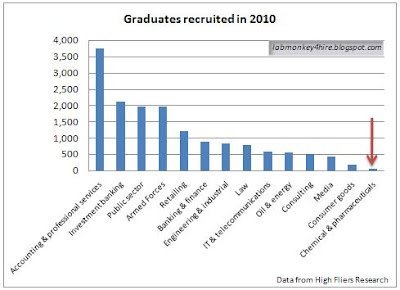
As a scientist, studying for a PhD is not unusual – as discussed previously, it’s a well-respected accomplishment which opens up opportunities that may otherwise be more difficult to achieve, and more. While the employment rate fell and unemployment rate rose, the number of chemistry graduates choosing to continue to study in the UK for a higher degree absorbed some of the difference, and climbed from 26 to 30%. Whether this is to remain in academia to avoid a weak job market, or a larger proportion of graduates now feel a PhD will put them in better stead for their career, the market may need to adapt to an increase of PhD-qualified chemists 3-4 years down the line.
Of the 4 in 10 chemistry graduates who entered employment in 2009, a far smaller proportion went into scientific research than in previous years. In 2006-8 this figure hovered around 23%, before dropping to 17% last year. Conversely, the number entering retail, catering, waiting and bar occupations has jumped from around 8% to 13%. That is not to say there are not good opportunities in this sector, but the strong correlation of these sets of figures suggest many more chemists may be entering service work who may otherwise be added to the unemployment figures. The number entering other “non-professional” occupations has also been steadily increasing from 7 to 12% over the four years.
While this may all seem like doom and gloom – employment down, unemployment up, research entrants down, bar staff up – it’s all relative. Compared to other degree subject areas examined by Prospects, the chemist graduate unemployment rate is the 8th lowest out of 27. While the graduate chemist employment rate is fourth lowest, this is because many scientists traditionally study for a higher degree (ranked 3rd highest out of 27). And if it can be deemed a bellwether for “hidden unemployment”, chemists also come fairly low on the catering/bar staff ranking as well (at 10th lowest).
So in summary: What do chemistry graduates do? An increasing number are continuing their studies as the proportion entering employment falls and unemployment rises. Of those entering employment, the number carrying out scientific research has notably dropped recently, with a simultaneous increase in those entering service occupations. While the situation looks bleak for chemists, compared to graduates in other subjects, we’re faring well. Our unemployment rate is lower than the majority, and we have the capability and infrastructure to pursue further study.
While fewer may be entering scientific research, it remains to be seen whether this is a temporary situation. Regardless, the mindset and transferrable skills of a chemist are highly regarded by industry: willingness and ability to learn and apply knowledge; analytical and research skills; self-motivation and being proactive (demonstrated with personal research projects); and hard-working.
And I couldn’t recommend it highly enough.




